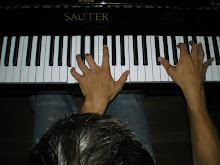One of the things i dont understand is why we are still carrying around some implicit assumptions about classical music- in particular the public and musicians assumption that there are "classical" instruments and "popular" or "non-classical" instruments. This is pure and utter
bullshit. There are instruments which were historically used in "classical music", yes, but we must keep in mind, when new instruments arose in the old days, they were embraced, not wholly rejected, as the developments and changes in the possibility of instrumentation from the 1930s-on have been. Looking at Monteverdi, Haydn, at Beethoven and Berlioz will teach us that new instruments were not subject to such suspicion or rejection in the past, why are we still rejecting these new developments in electronics, amplification, in drums, of electric guitars and basses and all that into the orchestra? (when we're really turning our back on historical precedents, not preserving them) There is no reason but empty-headed conservatism, that preservation of some "tradition" that never existed- If papa haydn can reform the orchestra, i think we can do it now.
This is a problem we could easily trace back to the 19th century and the standardization of the orchestra, but even then we see some substantial changes... from the introduction of the harp with berlioz to the tuba of wagner and the invention of the saxophone, rimsky korsakov and even Saint Saens' and tchaikovsky's experimented with new instrumentation. There was some new stuff going on too, though not widely spread- but there were not as new, or radically new instruments to embrace, and the standardized orchestra at that time was still a fairly new. There were many attempts to bring in some new instruments in the 20th century by many composers- but nothing has been able to become standard. Why? because the institution of the orchestra had already grown too conservative and resistant to dissonant modern music.
The freshness of the instrumentation of the standard orchestra is gone. We're still sitting around trying to get new sounds out of an old ensemble (Adams? Del Tredici?
Philip Glass?!?) - this multi-foliated instrument of the orchestra has existed relatively unchanged since the mid-19th century, and as far as i can tell, this is an example of bend or break. Since musicians or orchestras (and composers!!) have been resistant to change, the natural result is an ever-increasing obscurity. Jazz may also fall into this trap in the next few decades (or already has?) and get swallowed by a conservatism that would have appalled the earlier masters of the genre.
As far as i can tell, ensembles like Philip Glass' and Reich's were on the right path back in the 70s. Michael Gordon and Gollijov are on it now. They got it right. The old instruments of the ancient oboe, the clarinet, the piano, the violin, Does anyone in their right mind suspect that they're going to actually disappear from use in the next century? anything’s possible, but its highly unlikely, so what is this fear of change? why the lack of warmth to new instruments? Are they that threatening?
When i was younger i used to believe in some platonic "purity of form" or "uniformity" of sound- that it didnt matter what instruments the chord was playing it, it was still the same, the same music. That concept, i realized, along with all those other platonic assumptions we're still collectively carrying around in our culture, is complete
bullshit. Music does not operate or exist in some perfect platonic form in the ethos beyond perception (
which is in part, as far as im concerned the implicit assumption of all 12 tone music)* it is
essentially determined by its instrumentation and performance, by its perception. The same tone row on an electric guitar and on a piano are two different musics, they are not the same. Analyze the sound waves- do an electric guitar and a piano produce the same waves of sound? no, they are different- and that means that the
essential (not the incidental
) part of the music is altered- meaning its not some trivial detail of "mere instrumentation". To think otherwise is to buy into that concept of Platonic " perfect forms" in music.
So its sink or swim (ok, maybe not that dramatic) as far as i can tell. If you have any rational argument for why we shouldn’t embrace new technology in the classical establishment, im all ears- but as it is, i see no reason for it- just a lack of reflection and clear thinking, (and maybe its the historical aspect that draws people to the genre in the first place?).
________________
*i have just crushed the theory behind 12 tone music. **
___
**ok, maybe thats a bit presumptuous.....
Maybe.
